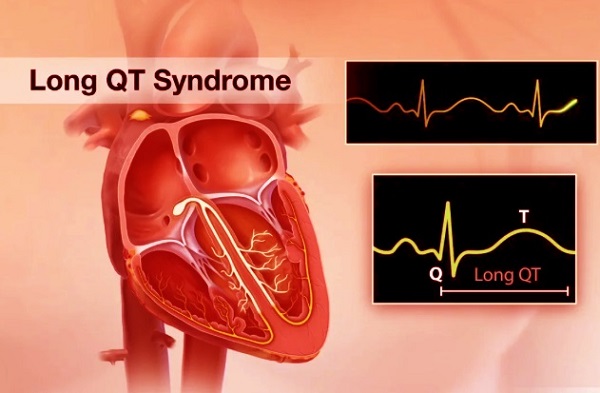Reinfections Involving the New SARS-CoV-2 Variants Such as NB.1.8.1, LF.7.7.2 and XFG Can Cause QT Interval Prolongation and Death!
Nikhil Prasad Fact checked by:Thailand Medical News Team May 26, 2025 8 months, 4 weeks, 1 day, 23 minutes ago
Medical News: New Variants, New Dangers
As the world continues to grapple with the ongoing consequences of the COVID-19 pandemic, new and evolving variants of the SARS-CoV-2 virus are presenting unexpected and troubling complications. Among the latest variants—NB.1.8.1, LF.7.7.2, and XFG—preliminary emerging data from Taiwan, China and Hong Kong that have yet to be published, are indicating a concerning cardiac issue associated with reinfections: a condition known as QT interval prolongation. This condition can lead to serious heart rhythm problems and, in severe cases, life-threatening arrhythmias.
 Reinfections Involving the New SARS-CoV-2 Variants Such as NB.1.8.1, LF.7.7.2 and XFG Can Cause QT Interval
Reinfections Involving the New SARS-CoV-2 Variants Such as NB.1.8.1, LF.7.7.2 and XFG Can Cause QT Interval
Prolongation and Death!
The QT interval is a segment seen on an electrocardiogram (ECG) that reflects the time it takes for the heart to recharge between beats. When this interval becomes too long—a phenomenon known as QT prolongation—the risk of irregular heartbeats, fainting, seizures, and even sudden death rises significantly.
Alarmingly, this
Medical News report sheds light on how new SARS-CoV-2 variants may be exacerbating this issue, especially in reinfected individuals.
COVID-19 and the Heart—A Hidden Threat
While COVID-19 is primarily known as a respiratory disease, its impact on the cardiovascular system has become increasingly evident. During earlier waves of the pandemic, studies observed that COVID-19 patients, even those not on drugs like hydroxychloroquine or azithromycin, were displaying longer QT intervals compared to other hospitalized patients. This phenomenon wasn’t just an isolated event—it hinted at the virus’s ability to directly interfere with the heart’s electrical system.
One notable study from New York City during the pandemic’s early days revealed a striking pattern. Even in patients not receiving known QT-prolonging drugs, those infected with the virus were more likely to develop dangerously long QT intervals. At least one patient developed a serious condition called torsade de pointes—a potentially deadly type of ventricular tachycardia. Researchers believe this was due to a combination of existing health conditions and the heart-damaging effects of the virus, which included inflammation and abnormal blood chemistry.
How the Virus Disrupts Heart Rhythms
So, how does the SARS-CoV-2 virus contribute to QT prolongation and arrhythmias? The answer lies deep in the heart’s cells. Like all cells, heart muscle cells depend on tiny proteins called ion channels to regulate the flow of electrically charged particles (such as potassium and calcium) across cell membranes. These channels ensure the heart beats in a regular, coordinated manner.
But viruses—especially SARS-CoV-2—can throw this delicate system off balance. Some viral proteins can directly interfere with ion channels
, while others may cause inflammation that alters how these channels function. This viral manipulation of ion transport is known as a "viral channelopathy." In the case of SARS-CoV-2, excessive inflammation and changes in calcium and potassium flow can delay the heart’s recovery after each beat—stretching out the QT interval and opening the door to arrhythmias.
Reinfections Raise the Risk Even Higher
What’s especially worrying about these new variants like NB.1.8.1, LF.7.7.2, and XFG is that reinfections seem to compound the risk of QT prolongation. Repeated exposure to the virus appears to trigger lingering inflammation, damage to heart muscle cells, and possible long-term changes in how the heart’s ion channels function. In other words, each reinfection increases the chance of cardiac complications.
Some scientists believe that over time, reinfections may gradually damage cardiac tissue in ways we don’t yet fully understand—leading not only to arrhythmias but potentially to more permanent heart conditions. This is especially troubling in populations already vulnerable to heart issues, such as the elderly or those with pre-existing cardiovascular disease.
What This Means for Patients and Doctors
QT interval prolongation is not something that most people feel or notice. It’s usually discovered during an ECG or after a related complication occurs. This makes it a silent but dangerous threat, especially in people recovering from COVID-19 or facing reinfections from the new variants. It underscores the importance of close cardiac monitoring, especially in high-risk patients.
Doctors are advised to be cautious about prescribing any drugs that could further prolong the QT interval in post-COVID patients. They should also correct other contributing factors such as low magnesium or potassium levels. There is some preliminary evidence that medications like mexiletine—traditionally used for other heart issues—may help shorten the QT interval, but how safe or effective they are in COVID-19 patients remains to be seen.
So far most of the COVID-19 deaths seen in Hong Kong, Taiwan and China in the current COVID-19 surge have been due to organ failure, stroke and mostly due to QT prolongation issues.
Conclusion
The emergence of SARS-CoV-2 variants like NB.1.8.1, LF.7.7.2, and XFG underscores how COVID-19 continues to evolve in unpredictable and dangerous ways. Beyond its well-known respiratory symptoms, the virus is capable of causing serious cardiac complications through mechanisms such as QT interval prolongation. These effects, particularly concerning during reinfections, highlight the need for long-term follow-up and cardiac evaluations in recovering patients. As scientists continue to uncover more about the virus’s interaction with the body’s electrical systems, staying informed and vigilant remains critical for both the medical community and the general public.
References:
https://www.thailandmedical.news/news/covid-19-causes-qtc-prolongations-and-disruptions-in-cardiac-electrophysiol
https://jamanetwork.com/journals/jamanetworkopen/fullarticle/2779053
https://tcpharm.org/DOIx.php?id=10.12793/tcp.2021.29.e20
https://www.frontiersin.org/journals/physiology/articles/10.3389/fphys.2016.00308/full
https://www.microbiologyresearch.org/content/journal/jgv/10.1099/jgv.0.000712
https://www.cureus.com/articles/95801-the-effect-of-covid-19-on-qtc-prolongation#!/
https://link.springer.com/article/10.1007/s40745-022-00425-5
https://www.nature.com/articles/s41577-018-0098-z
https://www.ahajournals.org/doi/10.1161/CIRCRESAHA.108.177360
https://www.revespcardiol.org/en-drug-induced-qt-prolongation-in-covid--p-articulo-S1885585720304710
https://www.pnas.org/doi/full/10.1073/pnas.0509961103
https://academic.oup.com/europace/article/22/10/1479/5842075
https://jcimcr.org/pdfs/JCIMCR-v3-2055.pdf
https://bmccardiovascdisord.biomedcentral.com/articles/10.1186/s12872-021-01963-1
For the latest COVID-19 News, keep on logging to Thailand
Medical News.
Read Also:
https://www.thailandmedical.news/news/covid-19-news-mayo-clinic-study-shows-that-sars-cov-2-spike-protein-mediates-cardiomyocyte-fusion-leading-to-increased-arrhythmic-risk
https://www.thailandmedical.news/news/viruses-including-sars-cov-2-silently-attack-heart-communication-proteins-leading-to-deadly-arrhythmias-and-myocarditis
https://www.thailandmedical.news/news/doctors-warn-that-covid-19-infections-can-induce-a-dangerous-condition-known-as-complete-heart-block
https://www.thailandmedical.news/articles/coronavirus
https://www.thailandmedical.news/pages/thailand_doctors_listings
